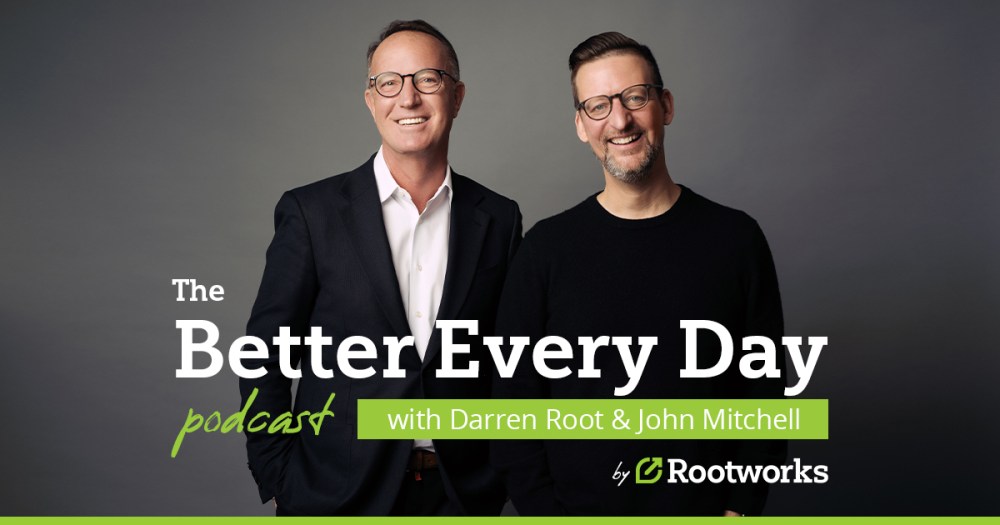In “The Seven Habits of Highly Effective People,” author and motivational speaker Stephen R. Covey introduced the concept of the emotional bank account.
Much like a financial bank account, we make deposits and withdrawals to our emotional bank accounts. But in this case, rather than money, we’re building up and withdrawing from a reserve of trust with other people. Our deposit currencies are positive actions (e.g., honesty, kindness, integrity, gestures of goodwill), while the withdrawals are activated by negative actions, like ignoring a partner or team member’s problems, disrespect or not meeting commitments.
In a recent Better Every Day episode, The emotional bank account, Darren Root, Chief Strategist for Right Networks, and John Mitchell, Culture and Workforce Advisor for Right Networks, talked about why it’s imperative for today’s firm leaders to understand the importance of the emotional bank account.
The value of deposits
It’s hard to deny that the last few years have been rough on all of us. In the podcast, John cited statistics from Mental Health America that show how much mental health has been impacted in the wake of the COVID-19 pandemic: Anxiety screens were up by 634% from January to September of 2020, with depression screens up 873%.
Even though the worst of the pandemic seems to have waned, the aftereffects continue in many industries. In accounting firms, record numbers of workers have left the profession. People are burned out by long hours and a lack of work-life balance. In addition, fewer workers are entering the field. And it doesn’t help that employees who had a two-year taste of freedom working from home are being called back to work in offices. Some are going back to a hybrid office/remote arrangement, while others are going back full time.
In an environment like this, how can firm leaders manage to keep the team members they do have engaged and happy? That’s where Darren and John firmly believe the emotional bank account can help. They’ve both practiced the concept for some time, at work and in their personal relationships.
“I think that’s why we’re seeing so much turnover in places,” Darren says during the podcast. “People aren’t being valued, they’re not feeling valued enough. There are not enough deposits for them to hang around and continue to do what they’re doing.”
How to make deposits
So as a firm leader, how can you be sure you’re giving your team the support and validation all human beings crave? According to Stephen Covey, there are six types of major deposits we can make to someone else’s emotional bank account:
- Understand the individual—Keep in mind the old saying and walk a mile in their shoes. Show interest in their lives, their worldview, their hopes and dreams.
- Attend to the little things—Always show respect. Prove that you think of them and care with small gestures: kind words, courtesy and little acts of kindness.
- Keep your commitments—Avoid rash promises. When you do make a promise, keep it. Show up on time, make that meeting and don’t blow off that phone call.
- Clarify expectations—Don’t automatically assume others know what you’re talking about. Define your expectations—not only for yourself but for them.
- Show personal integrity—Be honest. Define your vision, and then show everyone that you’re not exempt from following the guidelines you set out.
- Apologize when you make a withdrawal—No one’s perfect. Offer a sincere apology, admit any mistakes and take responsibility for your actions.
Like any bank account, if you make regular deposits into your emotional bank account, you’ll have a tidy amount of capital—in the form of goodwill and trust—to invest in and improve your work and personal relationships. However, when you only make withdrawals, your account will eventually become overdrawn. And it’s tough to ask for favors and loyalty when the person you’re asking doesn’t feel that you value them enough to respond in kind.
If you’d like to learn more about what you can do to true up the balance in your emotional bank account for your team, take a few minutes today to listen to Darren and John’s podcast for some ideas. And check out our previous Better Every Day episodes here.
You can also find a number of free on-demand webinars and blog articles on improving your firm culture at rootworks.com/resources.


